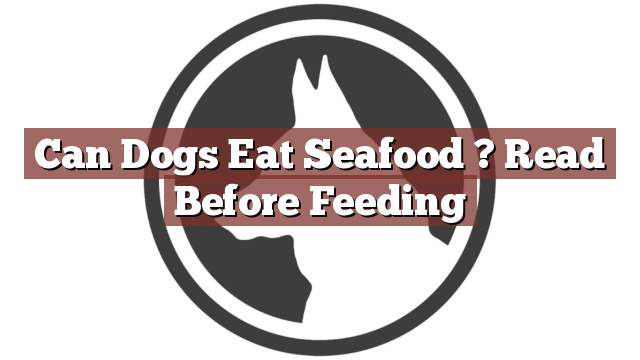Understanding Your Dog’s Dietary Needs
As responsible dog owners, it is crucial for us to understand our furry companions’ dietary needs. Providing a balanced and nutritious diet is essential to keep them healthy and happy. While dogs are primarily carnivorous animals, their bodies are also capable of digesting certain plant-based foods. However, not all human foods are suitable for dogs, and it is important to be aware of what they can and cannot eat.
Can Dogs Eat Seafood? Read Before Feeding
One common question that arises is, "Can dogs eat seafood?" The answer to this question is yes, but with some considerations. Seafood can be a healthy addition to a dog’s diet, as it is a good source of protein, omega-3 fatty acids, vitamins, and minerals. These nutrients are beneficial for a dog’s overall health, promoting a healthy immune system, skin, and coat.
However, it is essential to note that not all types of seafood are safe for dogs. Certain species of fish, such as salmon and tuna, can contain high levels of mercury, which can be toxic to dogs if consumed in large quantities. Additionally, shellfish like shrimp and lobster may pose a risk of causing allergic reactions in some dogs. Therefore, it is crucial to introduce seafood gradually into your dog’s diet and monitor for any adverse reactions.
Pros and Cons of Feeding Seafood to Dogs
Feeding seafood to dogs can have its pros and cons. On the positive side, seafood offers a variety of health benefits to dogs. The omega-3 fatty acids found in fish can help reduce inflammation, improve cognitive function, and support a healthy heart. Seafood is also a great alternative protein source for dogs with allergies to traditional meats like beef or chicken.
However, there are a few potential drawbacks to consider. Seafood, especially raw or undercooked fish, may contain parasites or bacteria that can cause gastrointestinal issues in dogs. Additionally, certain types of fish, such as those with small bones, can pose a choking hazard or lead to intestinal blockage if not properly prepared. It is crucial to thoroughly cook fish and remove any bones before feeding it to your dog to avoid these risks.
Conclusion: Make Informed Choices for Your Dog’s Health
In conclusion, dogs can eat seafood, but it is important to make informed choices and take precautions. It is recommended to consult with your veterinarian before introducing any new food into your dog’s diet, especially if they have any underlying health conditions or dietary restrictions. When feeding seafood to your dog, always ensure it is cooked thoroughly, boneless, and free from seasonings or additives that may be harmful to them. Monitoring your dog for any signs of allergies or digestive issues is also crucial. By being cautious and responsible, you can incorporate seafood into your dog’s diet in a safe and beneficial way.
Thank you for taking the time to read through our exploration of [page_title]. As every dog lover knows, our furry friends have unique dietary needs and responses, often varying from one canine to another. This is why it's paramount to approach any changes in their diet with caution and knowledge.
Before introducing any new treats or making alterations to your dog's diet based on our insights, it's crucial to consult with a veterinarian about [page_title]. Their expertise ensures that the choices you make are well-suited to your particular pet's health and well-being.
Even seemingly harmless foods can sometimes lead to allergic reactions or digestive issues, which is why monitoring your dog after introducing any new food item is essential.
The content provided here on [page_title] is crafted with care, thorough research, and a genuine love for dogs. Nevertheless, it serves as a general guideline and should not be considered a substitute for professional veterinary advice.
Always prioritize the expert insights of your veterinarian, and remember that the health and happiness of your furry companion come first.
May your journey with your pet continue to be filled with joy, love, and safe culinary adventures. Happy reading, and even happier snacking for your canine friend!

